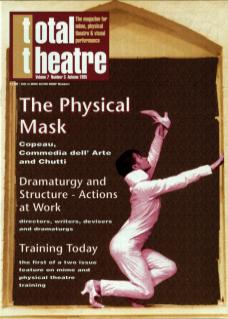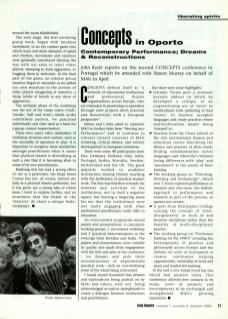Concepts defines itself as ‘a network of educational institutions and professional theatre organisations across Europe, who are interested in promoting cooperation through joint projects (both practical and theoretical) with a European perspective’.
Simon and I were asked to represent MAG to further links from Moving into Performance and to continue to connect current concerns of MAG (training, critical debate, and artistic development) to European initiatives.
There were some 80 participants from Eire, Germany, Holland, Italy, India, Portugal, Serbia, Slovakia, Sweden, Switzerland, and the UK. The great majority worked in academic institutions mixing theatre teaching with the facilitation of practical student work. The bias was therefore towards the interests and activities of the institutions, not in itself a negative aspect, but leaving a lingering sense for me that the institutions were not really engaging with what professional practitioners could offer to education.
An overcrowded programme mixed papers and presentations, four concurrent working groups, one movement workshop and two practical demonstrations in the evenings from Slovakia and India. The papers and presentations were variable in quality and made little engagement with the title and aims of the conference – no dreams and only three reconstructions of departmental practical work – with an overwhelming sense of the wheel being reinvented.
I found myself frustrated that debates and explorations being pushed on by MAG and others were not being acknowledged or used as springboards to create a dialogue between institutions and practitioners.
But there were some highlights: Jatinder Verma gave a resonant keynote address in which he developed a critique of an unquestioning use of 'roots' in multicultural work, preferring to find 'routes' to fracture accepted languages and create practices where multiculturalism meant being ‘listened' to. Teachers from the Utrecht School of the Arts international theatre and education course describing the theory and practice of their work; finding communication across languages and ethnicities without losing differences with 'play' and movement' at the centre of their training. The working group on Directing, Devising and Dramaturgy, which over seven hours explored performance as research and vice-versa, the holistic approach to performance, and research as part of the process, as partner not servant. A poet from Dartington College coining the concept of 'interdisciplinarity' or work of and between disciplines rather than the banality of multi-disciplinary practice. The working group on Performer Training for the 1990s revealing the heterogeneity of practice and philosophy across Europe and the debates on actor as instrument or creator, continuous training opportunities, ownership of work and space and market-led training.
In the end a very mixed event but one which had positive notes. This conference allowed new contacts to be made, news of projects and developments to be exchanged, and strengthened MAG's growing reputation.

